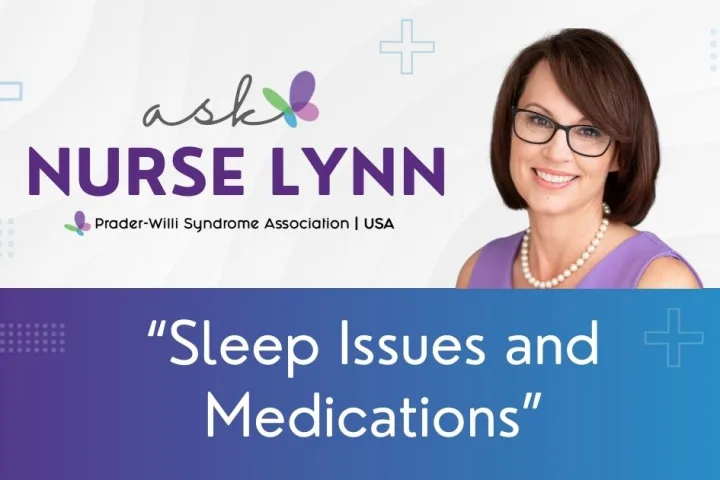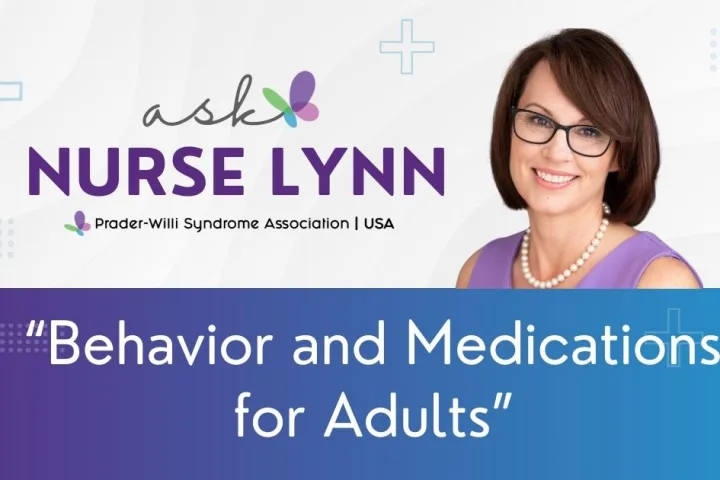Question:
Male, 18 years old, UPD subtype
My son struggles with psychosis/schizophrenia for 1.5 yrs. None of the antipsychotics applied reduced the symptoms. He is in a miserable situation. The doctors want to use Clozapine as last resource. Is this a drug used frequently in people with PWS and psychosis? Do you have any suggestions or comments? I am so worried as I know that this drug may have severe side-effects. However, my son needs help, and I will do what the doctors recommend. I should note that the psychiatrist who suggested this drug is specialized in PWS. He is in Germany. I just wanted to get an opinion from the US. Thank you so much.
Nurse Lynn’s Response:
You’re absolutely right: Clozapine is a serious medication, typically reserved for cases where other antipsychotics haven’t worked — a situation known as treatment-resistant psychosis. It is sometimes used in individuals with Prader-Willi Syndrome (PWS) and psychosis, but always with extra caution. The fact that you’re researching, asking questions, and carefully weighing the options means you’re already on the right track.
- 1. Clozapine is not typically a first-line treatment, but it can be life-changing. Clozapine is sometimes the most effective option for difficult-to-treat psychosis — even in people with PWS. For some, it’s the only medication that truly helps.
- 2. Specific concerns in Prader-Willi Syndrome: People with PWS can be more vulnerable to certain side effects, so careful monitoring is essential:
-
- *Metabolic risks (e.g., weight gain, insulin resistance, blood sugar issues) may be heightened, and Clozapine can exacerbate those.
- *Other risks to watch closely for include excessive sedation, seizures, and constipation.
- *Despite these risks, when psychosis severely affects quality of life, many experts believe Clozapine is worth considering — but always with close supervision and a tailored approach.
- *Metabolic risks (e.g., weight gain, insulin resistance, blood sugar issues) may be heightened, and Clozapine can exacerbate those.
3. Clozapine is used in PWS in the U.S. too — with expert oversight. Although it’s not a standard first choice, specialists in the U.S. do prescribe Clozapine to select patients with PWS and psychosis when other treatments have failed. It sounds like you have access to similar expertise in Germany, which is crucial.
4. Monitoring is critical to safety and success: Starting Clozapine involves strict protocols — and for good reason:
- *Weekly blood tests at the beginning to catch rare but serious side effects like agranulocytosis (a drop in white blood cells).
- *Regular monitoring of heart function, liver enzymes, and metabolic markers.
- *Watching for signs of infection, extreme tiredness, GI issues, or unusual behaviors
Your son’s journey — 1.5 years of psychosis without relief — is deeply painful. Watching someone you love suffer through that, especially without answers, is exhausting and heartbreaking. If other medications haven’t helped, Clozapine may truly be his best chance at regaining stability and quality of life.
Some families describe Clozapine as a turning point after long months (or years) of struggle. Others have to stop it due to side effects — but even then, many feel reassured knowing they gave every option a chance.
A Few Suggestions:
- 1. Comprehensive pre-assessment: Make sure your son’s cardiac, metabolic, and seizure risk factors are evaluated beforehand — this helps guide safer use.
- 2. Slow titration can help: A very gradual increase in dosage may improve tolerability, especially in individuals with PWS who may be more sensitive.
3. Ongoing emotional and behavioral support: Medication is only one piece of the puzzle. Continued support — for your son and for your family — is essential. In some cases, specialized care environments are needed when symptoms are especially severe.
Resources:
There is an “ask a professional” service through IPWSO the International PWS association which you could ask international experts questions. https://ipwso.org/how-we-can-help/ask-a-professional/
Do you have a non-emergency medical question for Nurse Lynn? Submit your question here:
Share this!





 Perry A. Zirkel has written more than 1,500 publications on various aspects of school law, with an emphasis on legal issues in special education. He writes a regular column for NAESP’s Principal magazine and NASP’s Communiqué newsletter, and he did so previously for Phi Delta Kappan and Teaching Exceptional Children.
Perry A. Zirkel has written more than 1,500 publications on various aspects of school law, with an emphasis on legal issues in special education. He writes a regular column for NAESP’s Principal magazine and NASP’s Communiqué newsletter, and he did so previously for Phi Delta Kappan and Teaching Exceptional Children. Jennifer Bolander has been serving as a Special Education Specialist for PWSA (USA) since October of 2015. She is a graduate of John Carroll University and lives in Ohio with her husband Brad and daughters Kate (17), and Sophia (13) who was born with PWS.
Jennifer Bolander has been serving as a Special Education Specialist for PWSA (USA) since October of 2015. She is a graduate of John Carroll University and lives in Ohio with her husband Brad and daughters Kate (17), and Sophia (13) who was born with PWS. Dr. Amy McTighe is the PWS Program Manager and Inpatient Teacher at the Center for Prader-Willi Syndrome at the Children’s Institute of Pittsburgh. She graduated from Duquesne University receiving her Bachelor’s and Master’s degree in Education with a focus on elementary education, special education, and language arts.
Dr. Amy McTighe is the PWS Program Manager and Inpatient Teacher at the Center for Prader-Willi Syndrome at the Children’s Institute of Pittsburgh. She graduated from Duquesne University receiving her Bachelor’s and Master’s degree in Education with a focus on elementary education, special education, and language arts. Evan has worked with the Prader-Willi Syndrome Association (USA) since 2007 primarily as a Crisis Intervention and Family Support Counselor. Evans works with parents and schools to foster strong collaborative relationships and appropriate educational environments for students with PWS.
Evan has worked with the Prader-Willi Syndrome Association (USA) since 2007 primarily as a Crisis Intervention and Family Support Counselor. Evans works with parents and schools to foster strong collaborative relationships and appropriate educational environments for students with PWS. Staci Zimmerman works for Prader-Willi Syndrome Association of Colorado as an Individualized Education Program (IEP) consultant. Staci collaborates with the PWS multi-disciplinary clinic at the Children’s Hospital in Denver supporting families and school districts around the United States with their child’s Individual Educational Plan.
Staci Zimmerman works for Prader-Willi Syndrome Association of Colorado as an Individualized Education Program (IEP) consultant. Staci collaborates with the PWS multi-disciplinary clinic at the Children’s Hospital in Denver supporting families and school districts around the United States with their child’s Individual Educational Plan. Founded in 2001, SDLC is a non-profit legal services organization dedicated to protecting and advancing the legal rights of people with disabilities throughout the South. It partners with the Southern Poverty Law Center, Protection and Advocacy (P&A) programs, Legal Services Corporations (LSC) and disability organizations on major, systemic disability rights issues involving the Individuals with Disabilities Education Act (IDEA), Americans with Disabilities Act (ADA), and the federal Medicaid Act. Recently in November 2014, Jim retired.
Founded in 2001, SDLC is a non-profit legal services organization dedicated to protecting and advancing the legal rights of people with disabilities throughout the South. It partners with the Southern Poverty Law Center, Protection and Advocacy (P&A) programs, Legal Services Corporations (LSC) and disability organizations on major, systemic disability rights issues involving the Individuals with Disabilities Education Act (IDEA), Americans with Disabilities Act (ADA), and the federal Medicaid Act. Recently in November 2014, Jim retired.